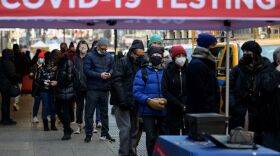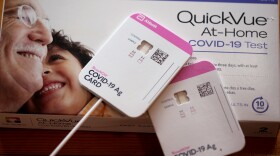
Mary Louise Kelly
Mary Louise Kelly is a co-host of All Things Considered, NPR's award-winning afternoon newsmagazine.
Previously, she spent a decade as national security correspondent for NPR News, and she's kept that focus in her role as anchor. That's meant taking All Things Considered to Russia, North Korea, and beyond (including live coverage from Helsinki, for the infamous Trump-Putin summit). Her past reporting has tracked the CIA and other spy agencies, terrorism, wars, and rising nuclear powers. Kelly's assignments have found her deep in interviews at the Khyber Pass, at mosques in Hamburg, and in grimy Belfast bars.
Kelly first launched NPR's intelligence beat in 2004. After one particularly tough trip to Baghdad — so tough she wrote an essay about it for Newsweek — she decided to try trading the spy beat for spy fiction. Her debut espionage novel, Anonymous Sources, was published by Simon and Schuster in 2013. It's a tale of journalists, spies, and Pakistan's nuclear security. Her second novel, The Bullet, followed in 2015.
Kelly's writing has appeared in the Wall Street Journal, The New York Times, The Washington Post, Politico, Washingtonian, The Atlantic, and other publications. She has lectured at Harvard and Stanford, and taught a course on national security and journalism at Georgetown University. In addition to her NPR work, Kelly serves as a contributing editor at The Atlantic, moderating newsmaker interviews at forums from Aspen to Abu Dhabi.
A Georgia native, Kelly's first job was pounding the streets as a political reporter at the Atlanta Journal-Constitution. In 1996, she made the leap to broadcasting, joining the team that launched BBC/Public Radio International's The World. The following year, Kelly moved to London to work as a producer for CNN and as a senior producer, host, and reporter for the BBC World Service.
Kelly graduated from Harvard University in 1993 with degrees in government, French language, and literature. Two years later, she completed a master's degree in European studies at Cambridge University in England.
-
In the face of rising COVID-19 cases, Dr. Bob Wachter of the University of California, San Francisco, offers reasons to be hopeful about the pandemic's outlook in the months ahead.
-
Three years later, and as we begin an election year where Donald Trump is the clear frontrunner for Republican nomination, we revisit the events of that day — and exactly what happened when.
-
The omicron situation seems to be changing so fast that it's hard to figure out which activities are safe on any given day. Two experts guide us through how to make a smart risk budget.
-
Harvard epidemiologist Michael Mina wants to increase availability of the at-home rapid tests the Biden administration is promoting. But he warns of a shortage without market competition.
-
Filipe Ribeiro of Doctors Without Borders Afghanistan talks to NPR about the future of the country's health care system under Taliban rule.
-
Over the years, Mitchell Garabedian has represented hundreds of survivors of clergy sexual abuse. His latest is a civil case against former U.S. Cardinal Theodore McCarrick.
-
NPR's Mary Louise Kelly talks with Sandy Ala, a counselor working with Jewish Community Services of South Florida, who has been talking with survivors and families waiting for news in Surfside.
-
Breanna Stewart's new sneaker deal with Puma includes the first signature shoe for a WNBA player in a decade. ESPN's Nick DePaula tells NPR's Mary Louise Kelly what it means for the industry.
-
A new documentary Street Gang: How We Got To Sesame Street recounts how the classic program reinvented children's television and continues to interpret the world with authenticity.
-
Gen. Sami Sadat spoke with NPR about day-to-day life in Afghanistan, how the army will operate without U.S. support and what he's learned over the years during the war.










